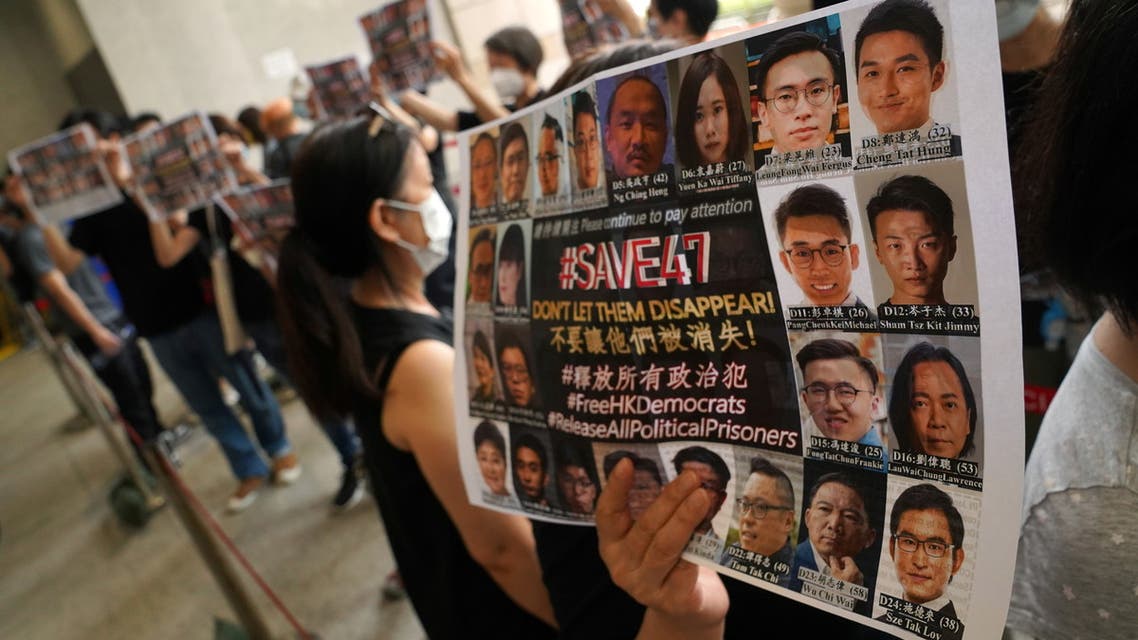
People hold signs to support pro-democracy activists charged with violating the national security law, as they queue up at West Kowloon Magistrates’ Courts for a court hearing, in Hong Kong, China May 31, 2021. (File photo: Reuters)
AFP, Hong Kong
Published: 25 October ,2021
Amnesty International said Monday it would shutter its offices in Hong Kong because of the threat posed to staff by a national security law that Beijing imposed on the city.
The decision ends more than four decades of the international human rights group maintaining a presence in Hong Kong and comes as officials remold the city in mainland China’s authoritarian image.
China imposed a national security law last June in response to massive and often violent democracy protests, a move that has transformed Hong Kong’s political, cultural and legal landscape and introduced mainland-style political speech curbs.
Anjhula Mya Singh Bais, chair of Amnesty’s board, said the decision to close had been made “with a heavy heart” and was “driven by Hong Kong’s national security law”.
“(It) has made it effectively impossible for human rights organizations in Hong Kong to work freely and without fear of serious reprisals from the government,” she added.
Amnesty maintains two offices in Hong Kong.
The first is a local branch that focuses on human rights and campaigns in the city.
The second is a regional office that carries out research and advocacy work across East and Southeast Asia and the Pacific.
In its announcement Amnesty said its local office would close on October 31 while the regional office would move out “by the end of 2021."
Decisively end Police brutality, Amnesty International tells FG
Oghenekevwe Uchechukwu
October 20, 2021

AMNESTY International has called on the Nigerian authorities to put words into action and decisively end Police impunity and ensure that the rights of Nigerians to peaceful protests as guaranteed by the constitution are protected.
Speaking on the occasion of the #EndSARS Memorial on Wednesday, Country Director of the organisation Osai Ojigho said an independent investigation by the organisation found that the Nigerian Army and Police killed at least 12 people on October 20, 2020 at Lekki Toll Gate and Alausa in Lagos.
“Amnesty International was able to establish that pro-government supporters instigated violence at many of the demonstrations, providing cover for the Police to use lethal force against peaceful protesters.
“The organisation also found that detained protesters were tortured and refused or denied immediate access to lawyers. In many cases, Police abuse continued in detention, in Police stations and other holding facilities, and on the way to detention, in Police vehicles,” Ojigho stated.
A year after the #EndSARS protest, members of the security forces found culpable of human rights violations are yet to be prosecuted, while judicial panels of inquiry set up to investigate abuses by officers have made little progress.
Amnesty International has urged the Nigerian government to thoroughly, independently, impartially, and transparently investigate suspected perpetrators of human rights violations in the country and bring them to justice.
“Failure to bring to justice those suspected to be responsible for the torture and killings of #EndSARS protesters on 20 October 2020 is yet another indication that Nigerian authorities lack the political will to ensure accountability for these atrocities, and end police brutality,” the organisation said.
- Advertisement -
Similarly, a Nigerian entertainer DJ Switch, who gained prominence after doing a live video of the Lekki Toll Gate shooting last October, has called out the Nigerian Minister for Information Lai Mohammed for discrediting the real-time information disseminated from the toll gate scene on the night of October 20, 2020.
Speaking at the Oslo Freedom Forum, a series of global conferences run by the New York-based non-profit Human Rights Foundation under the slogan ‘Challenging Power,’ DJ Switch stated: “Our leaders are afraid; it is as simple as that. They are afraid of a thinking, innovative and collaborative working Nigeria. They are afraid of every young Nigerian who, against all odds, have made it for themselves.”
Referencing Nigeria’s music legend Fela Anikulapo Kuti’s 1977 hit song, Zombie, where he likened the Nigerian Army to zombies, she said the song was relevant today, as it was 44 years ago.
The entertainer, who recently relocated out of the country and has remained a strong voice against Police brutality, added: “we stand up to our oppressors, starting with the Nigerian Minister of Information, Lai Mohammed.”
Despite the indefinite ban on Twitter in Nigeria, Nigerians within the country and in the diaspora, as well as other nationalities sympathetic the #EndSARS campaign which rode on the back of the global Black Lives Matter movement, have constituted a ‘netizen’ and launched a 20-day #EndSARS activism to commemorate the event of 20th October, 2020.
Various discourses are expected to be held, aimed at calling attention to the implementation of the five priority demands – the immediate release of all arrested protesters, justice for all deceased victims of police brutality, investigation and prosecution of all reported cases of police misconduct, psychological evaluation and retraining of all disbanded SARS officers by an independent body, and better salary and welfare for police officers.
Hippocratic Post | 19th October 2021 |

Covid-19: Global attack on freedom of expression is having a dangerous impact on public health crisis: Attacks on freedom of expression by governments, combined with a flood of misinformation across the world during the Covid-19 pandemic, have had a devastating impact on peoples’ ability to access accurate and timely information to help them cope with the burgeoning global health crisis, said Amnesty International today in a new report.
Silenced and Misinformed: Freedom of Expression in Danger During Covid-19 reveals how governments’ and authorities’ reliance on censorship and punishment throughout the crisis has reduced the quality of information reaching people. The pandemic has provided a dangerous situation where governments are using new legislation to shut down independent reporting, as well as attack people who have been directly critical or even attempted to look into their government’s response to Covid-19.
“Throughout the pandemic, governments have launched an unprecedented attack on freedom of expression, severely curtailing peoples’ rights. Communication channels have been targeted, social media has been censored, and media outlets have been closed down – having a dire impact of the public’s ability to access vital information about how to deal with Covid-19,” said Amnesty International’s senior director for research advocacy and policy, Rajat Khosla.
“In the midst of a pandemic, journalists and health professionals have been silenced and imprisoned. As a result, people have been unable to access information about Covid-19, including how to protect themselves and their communities. Approximately five million people have lost their lives to Covid-19 and lack of information will have likely been a contributory factor.”
The government of China has a long history of controlling freedom of expression. During the early days of the pandemic, health workers and professional and citizen journalists attempted to raise the alarm as early as December 2019. However, they were targeted by the government for reporting on the outbreak of what was then an unknown disease. By February 2020, 5,511 criminal investigations had been opened against individuals who published information about the outbreak for “fabricating and deliberately disseminating false and harmful information”.
In one harrowing case, citizen journalist Zhang Zhan travelled to Wuhan in February 2020 to report on the Covid-19 outbreak. She went missing in May 2020 in Wuhan. It was later revealed that she was detained by police, charged with “picking quarrels and provoking trouble” and sentenced to four years’ imprisonment.
Numerous other countries have put in place oppressive laws, restricting the right to freedom of expression and silencing critics under the guise or in the context of the pandemic, including Tanzania, Russia and Nicaragua.
Over the past few years, the Tanzanian government has introduced a raft of laws and used them to silence journalists, human rights defenders and members of the political opposition. Under former President Magufuli’s administration, the Tanzanian government took a denialist stance on Covid-19. From March to May 2020, authorities used laws prohibiting and criminalizing “false news” and other measures to restrict media coverage of the government’s handling of Covid-19.
While initially trying to downplay the impact of the pandemic and intimidate those raising concerns, the Nicaraguan authorities used Covid-19 to introduce the “Special Law on Cybercrimes” in October 2020. In practice, it enables authorities to punish those who criticize government policies and gives them ample discretion to repress freedom of expression.
In April 2020, Russia expanded its existing anti-“fake news” legislation and introduced criminal penalties for “public dissemination of knowingly false information” in the context of emergencies. Although the amendments have been described as part of the authorities’ response to Covid-19, these measures will remain in force beyond the pandemic.
“It’s clear Covid-19 related restrictions on freedom of expression are not just time-bound, extraordinary measures to deal with a temporary crisis. They are part of an onslaught on human rights that has been taking place globally in the last few years – and governments have found another excuse to ramp up their attack on civil society,” said Rajat Khosla.
“Restricting freedom of expression is dangerous and must not become the new normal. Governments must urgently lift such restrictions and guarantee the free flow of information to protect the public’s right to health.”
Amnesty’s report highlights the role of social media companies in facilitating the rapid spread of misinformation around Covid-19. This is because platforms are designed to amplify attention-grabbing content to engage users and have not done enough due diligence to prevent the spread of false and misleading information.
The onslaught of misinformation – whether that be through social media companies or people in a position of power seeking to spread division and confusion for their own gain – is posing a serious threat to the rights to freedom of expression and to health. It is making it increasingly difficult for individuals to have a fully informed opinion and make educated choices about their health based on the best available scientific facts. A variety of sources is key, as is the ability to challenge and debate available information.
“As we are urging governments and pharmaceutical companies to ensure vaccines are distributed and made available to everyone around the world, states and social media companies must also ensure the public has unfettered access to accurate, evidence-based and timely information. This is a crucial step to minimize vaccine hesitancy driven by misinformation,” said Rajat Khosla.
“So far, 6.6 billion* doses have been administered globally, yet only 2.5% of people in low-income countries have received at least one dose. With less than 75 days left until the end of the year, we’re calling on states and pharmaceutical companies to drastically change course and to do everything needed to deliver two billion vaccines to low and lower-middle income countries starting now – but they need safe, reliable information to help inform their decisions.”
Amnesty International is calling on states to stop using the pandemic as an excuse to silence independent reporting, lift all undue restrictions on the right to freedom of expression and provide credible, reliable, accessible information so the public can be fully informed about the pandemic. Censorship does not help in dealing with misinformation: free and independent media and strong civil society do.
States must overhaul the destructive business model of Big Tech – one of the root causes of the spread of mis/disinformation online. Social media companies must also stop hiding their heads in the sand and take measures to address the viral spread of misinformation, including by ensuring their business models do not endanger human rights.
Amnesty International launched a new campaign, 100 Day Countdown: 2 billion Covid-19 vaccines now! on 22 September 2021. The organization is calling on states and pharmaceutical companies to deliver 2 billion vaccines to those who need it now, to ensure that the World Health Organization’s target of vaccinating 40% of the population of low and lower-middle income countries by the end of the year is met.
* Figure correct as of 14 October 2021: Coronavirus (COVID-19) Vaccinations – Statistics and Research – Our World in Data
Hippocratic Post


 VARIOUS RELIGIOUS LEADERS have thrown their weight behind
VARIOUS RELIGIOUS LEADERS have thrown their weight behind  PROPOSALS TO END the need for food banks as a primary response to food insecurity have been published by the Scottish Government. Views are being sought on a draft national plan, which is supported by food bank operators including the Trussell Trust and the Independent Food Aid Network.
PROPOSALS TO END the need for food banks as a primary response to food insecurity have been published by the Scottish Government. Views are being sought on a draft national plan, which is supported by food bank operators including the Trussell Trust and the Independent Food Aid Network.






